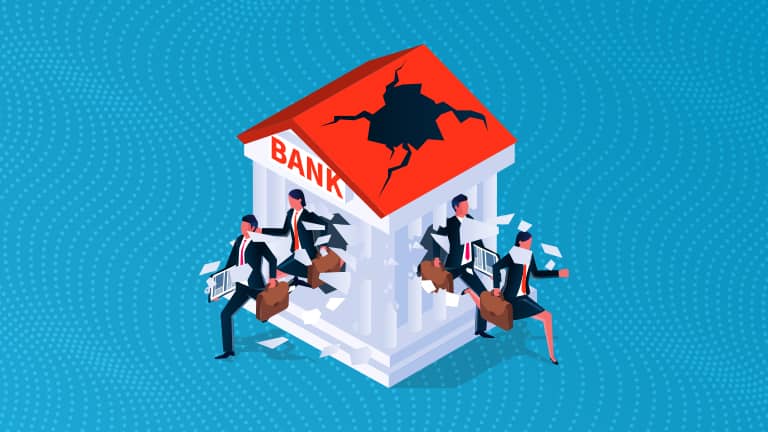
The banking industry became a hot topic of debate when two institutions recently failed. The banking collapse may have left you with many questions, including what happened and how to protect your money best. Federal and private insurance companies offer some level of protection against illiquid banks. However, it’s still important to understand the type of banking institution where you invest your money and what steps you can take to preserve your capital.
Key Takeaways
- In the most recent bank crisis, Silicon Valley Bank (SVB) and Signature Bank could not fund customer withdrawal requests, creating a bank run.
- Many financial experts believe the downfall of SVB could have been prevented if it had responded to economic indicators of increasing inflation.
- Overall, banks are a safe place to store your money providing you choose institutions that are insured by the Federal Deposit Insurance Corporation (FDIC) or the Securities Investor Protection Corporation (SIPC) and stay within insurance limits.
- Understanding the difference between traditional banks and custodian accounts can also help you protect your money in a bank crisis.
- Insurance limits are per person, per account, meaning dividing your money among multiple accounts can help limit risk.
The Bank Crisis Explained
The largest victim of the most recent bank crisis was SVB. The California-founded bank was heavily involved in the technology boom, with many of its customers working in or managing technology companies.
The board of directors and management of SVB purchased investments in the form of long-term government bonds at an average earning rate of 1.8%. The bank planned to hold these assets until maturity, but increasing inflation and higher interest rates led to their devaluation. As SVB had no liquidity, it didn’t have the cash available to pay investors.
As a consequence, SVB ended up selling long-term assets to other banks at a much lower value, leading to billions in losses. Banking customers responded by withdrawing their funds in large numbers, essentially dissolving the bank. The federal government officially closed the bank since it didn’t have sufficient funds to cover all withdrawal requests. Some financial experts claim the fall of SVB could have been prevented if the board had prepared and anticipated inflation. The company could have paid attention to the financial implications of rising inflation and hedged against losses, but it didn’t.
Shortly after, federal regulators also shut down Signature Bank. The bank run caused by the collapse of SVB led to Signature Bank customers also quickly withdrawing funds. The state of New York and U.S. federal regulators took control of the bank to ensure all customers received their funds. Flagstar Bank later agreed to acquire Signature Bank, and the federal government promised to honor all withdrawal requests.
Tax & Asset Protection Workshop
Learn about Real Estate & Asset Protection at our next
FREE LIVE STREAM
Are Banks Safe?
The recent bank crisis has led many to question the safety of banks. Increasing and decreasing interest rates are a normal part of the U.S. economy and so is inflation, meaning an illiquid bank isn’t a normal consequence. Generally, banks are a safe place to invest or hold your money, but it’s essential to understand protections and to choose the right accounts.
The following insurance can protect banks:
- FDIC: Protects some financial institutions and their investors up to $250,000.
- SIPC: Protects brokerage or custodial firm investors up to $500,000.
- Private insurance: Some brokerages or custodial accounts have separate private insurance policies that may cover up to $150 million.
Choosing FDIC- or SIPC-insured institutions is crucial to ensure you protect your investments. One of the biggest problems with SVB was that a large percentage of customer accounts exceeded $250,000, meaning the federal government didn’t insure them.
How To Protect Your Money From the Bank Crisis
Investing can be a great way to increase your wealth, but it’s always a good idea to have a strategy in place to protect your money. Inflation and volatile interest rates are a normal part of the economy, so choosing insured banks with a long history is crucial. Here are a few ways to help protect your money from the bank crisis.
Know the Difference Between Banks and Custodians
You have many banking options, and understanding the difference between banks and custodians is a great start. Banks take your and others’ money and invest it into the market, sometimes sharing a small percentage through interest rate returns. Your bank statement shows you how much the bank owes you rather than the amount currently in your account. A custodian works differently, with each account segregated. Custodian accounts store your funds and cannot move your money without permission.
Diversify Your Money
While custodian accounts offer many advantages, they’re not set up for daily transactions, making it important to have multiple account types. Dividing your money into “buckets” can help determine how much to keep in each account type. Keep funds for your daily expenses, including mortgage, gas, grocery, or bills, in a traditional banking account with less than $250,000.
The other bucket includes savings, emergency funds, or money you don’t need to access anytime soon. Move this money to a safer account with a higher yield return, such as a custodian account. Even though custodian accounts aren’t designed for daily transactions, many offer a debit card or checkbook that allows you to access your funds easily.
Diversifying your money also extends your insurance coverage. The FDIC insurance limits are per account per bank, not per person. This means opening multiple accounts or dividing your assets among multiple banking institutions can ensure you’re protected. Diversifying your funds among different bank sizes and types can add another layer of protection.
Research Credentials and Manage Risk
Reviewing a bank’s history before choosing where you’ll invest your funds is also a good idea. Smaller banks may offer slightly higher interest rates to encourage people to transfer funds to them. However, balancing risk with reward is important when choosing the best accounts to hold your funds. Smaller banks are more likely to become illiquid than larger ones with a proven track record. Significantly increasing risk to benefit from a few fractions of an interest rate increase may not be worth it.
Review Insurance
Always choose banks that are FDIC insured. Deposit only up to $250,000 for individual accounts and $500,000 for joint accounts to ensure you’re protected. You can always split your money among multiple banks to ensure full protection.
When choosing a brokerage, consider the ones that are SPIC insured, which means they cover up to $500,000 in deposits. Some brokerages even purchased additional insurance policies for each account, which means another layer of security. These extra insurance policies may be guaranteed up to millions of dollars, protecting you from the custodian going bankrupt. Private insurance policies mean you don’t depend on a government bailout to access your funds.
Choose a Fiduciary
A fiduciary refers to a person who acts on behalf of another person. Laws require fiduciaries to make investment or banking decisions based on the client rather than their own personal interests. Finding a fund manager or custodian may be as simple as asking if they’re a fiduciary. This means you can trust them to manage your funds and minimize risk.
Do Your Homework
Work with a fiduciary to ensure you choose the right products to protect your money. Understanding the type of account and the protections available is crucial when choosing where to place your money. Larger banking institutions may offer both custodian and traditional banking services, making it difficult to know your account type. Always verify with the bank that your money is segregated and part of the custodial arm of the business.
This may also be another good reason for working with a financial advisor. Let your financial advisor do the research on your behalf, ensuring that your funds are in protected accounts with the appropriate level of insurance coverage. Even if the bank dissolves or becomes illiquid, having the right insurance prevents you from losing your hard-earned money.
Overall, banks are a safe place to store your money and can even offer returns in the form of interest rates. The most recent bank crisis has taught us that it’s a good time to evaluate where you’re storing your money and how much of it is protected through insurance policies. The best time to consider asset protection is before you need to protect your assets. A financial advisor with a fiduciary responsibility can help you determine risk and structure your investments so that insolvent or illiquid banks don’t threaten your capital.
Anderson Advisors can help you plan for a volatile market that includes illiquid banks. Schedule a consultation today to review your asset protection strategy or to create one that protects your wealth. We’ll review some of the best strategies for minimizing risk while helping you preserve your assets despite a fluctuating economy.
Free Strategy Session with an Anderson Advisor
Receive a detailed risk assessment to assist in lowering problem areas that could wipe out all of your assets with one wrong move. Speak with an Anderson Professional Advisor to get your FREE Strategy Session.
Limited-Time Offer: ($750 value.)















